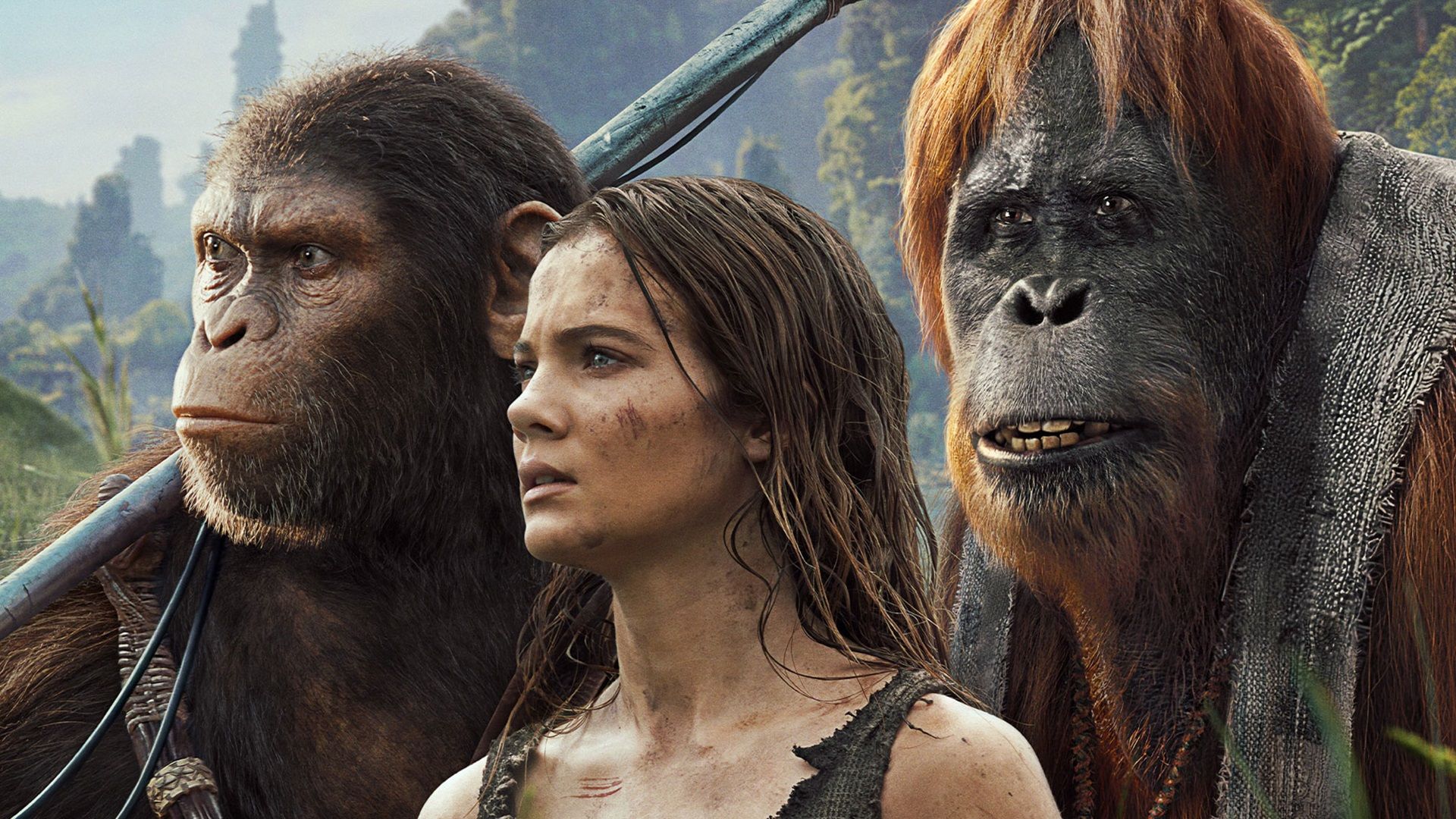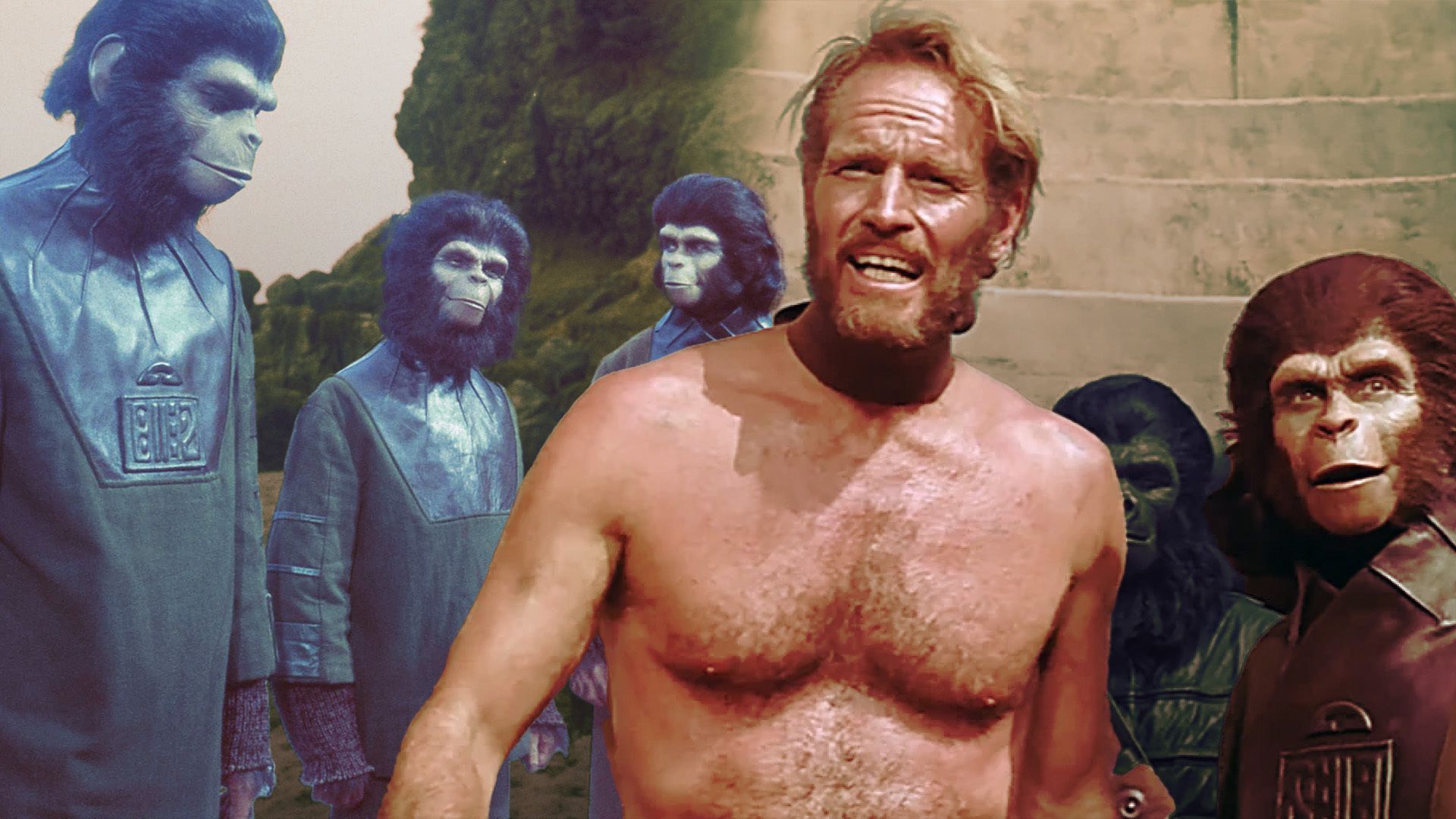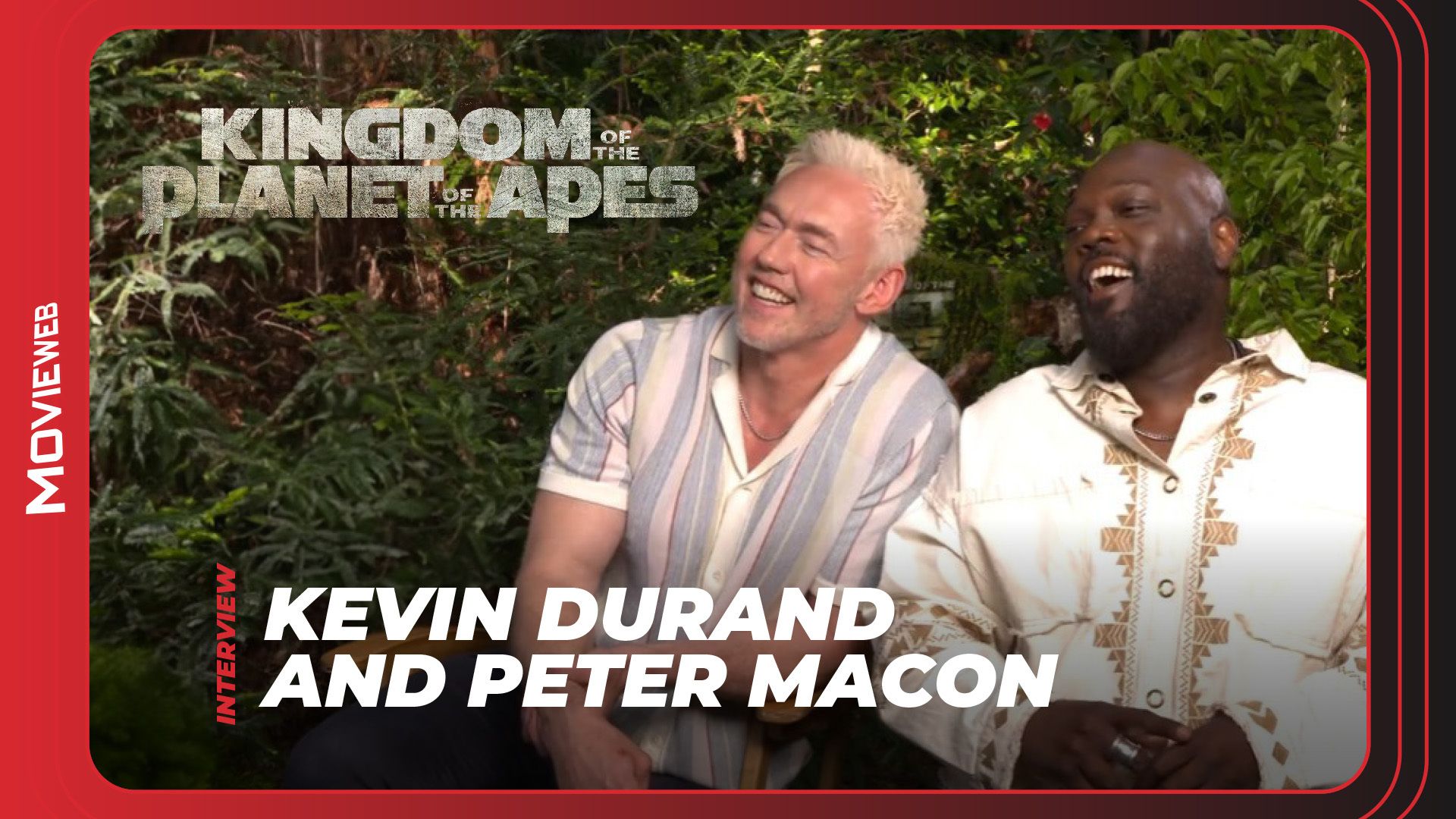Approximately 300 years after the events of War for the Planet of the Apes, Apedom has entered a new stage of its evolution. Caesar is long dead, but his influence and words live on in some parts of ape society, corrupted or misunderstood. Like the humans before them, ape society has evolved to varying degrees, with some living closer to nature, and others attempting to utilize the remains of human society for their own ends. This is the setting for Kingdom of the Planet of the Apes, a film director Wes Ball and 20th Century Studios hopes will start a whole new chapter in the Apes story.
The film centers on the character of Noa (Owen Teague), a young Chimpanzee who belongs to the Eagle Clan. They’re a small group of chimps who live in concert with the Eagles they raise and train, in a valley far removed from the rest of Ape civilization. Noa has never seen a human, who he knows as the “Echo,” until he meets Mae (Freya Allan). When an outside ape clan attacks Noa’s home and kidnaps his clan, Noa must leave the safety of his valley and work together with the human he doesn’t trust, in his attempt to save his family and friends, and bring them home.
Wes Ball originally rejected the offer to direct the next chapter in the Apes franchise, fearing there was no way he could reasonably follow the Caesar trilogy of films and create anything worthwhile. However, after ruminating on it for some time, Ball changed his mind and agreed to take on the project. Ball’s only caveat was that he be allowed to take a new approach to the Apes series. Instead of following on immediately after the events of War for the Planet of the Apes, his film would jump forward in time, giving the creative team room to breathe and create an entirely new story for the apes. MovieWeb sat down with Wes Ball to discuss his approach to bringing the apes into a new era.
The Start of a New Apes Era 300 Years Later
Kingdom of the Planet of the Apes
Set several years after the events of War for the Planet of the Apes, Kingdom of the Planet of the Apes is the next installment in the Apes saga. Ape clans have taken up residence in the oasis that Caesar sought to colonize, but humans have reverted to their animalistic nature in their absence. Now battling between enslavement and freedom, outliers in the Ape clans will take sides in a newly burgeoning society.
- Release Date
- May 10, 2024
- Studio
- Disney Studios Australia, Twentieth Century Fox
- Tagline
- No One Can Stop the Reign
One of the biggest challenges for any franchise is to leave the door open for a new audience, while also making sure to service the expectations of the fans who’ve already been along for the ride. When Ball took on the task of creating a new story in the Apes franchise, he was well aware of the coin he was trying to balance. “That’s the trick, honestly. It was the thing that gave me hesitation in the beginning about doing this one,” he admits. “I’m gonna have to find how we were going to follow up the previous three. I love those movies. They’re fantastic movies. They’re really well done. And I love the ’68 original.”
This was when Ball realized the trick was to jump forward in the timeline in order to give some space between the story that was, and the story he was going to tell. All while still leaving hundreds of years between his own story and the original Planet of the Apes from 1968. “Suddenly, we found ourselves in a place where, ‘Oh, we just fast-forward quite a bit.‘ We get to kind of create distance from those movies, so we’re not just endlessly compared to them, but we also get to take with us all the good baggage from that movie into our movie. You know what I mean? But we also have on the horizon the ’68 movie, and all the ideas that we know we have to eventually arrive at.”
This freed up the creative team to be much more open and loose with their story. A jump forward of hundreds of years means that not only is no one alive who lived through those events, but there’s been many generations since everyone who knew Caesar, or knew someone who knew Caesar, had passed on. This civilization is so removed from when the humans were the dominant species, that one could imagine many of them don’t even believe the stories of humanity as the apex predator.
It also allowed Ball to approach the story in an entirely new way. “It just opened up a whole world of opportunities,” he continues. “Of new characters, new story, a kind of new tone. It’s kind of a bit of an adventure this time, it’s got a younger spirit to it, right? A young character setting out and discovering the world for the first time. And we got to really play around with this idea of, what has been lost in that time?” He continued:
What has been changed in that time? Not just to the world, but the idea of Caesar himself. How does his legacy and the myth and legend of him hang over the story? I think it’s in a pretty big way. And it’s really shaped the character of Noa.

Kingdom of the Planet of the Apes Review: A Great Continuation & Epic Beginning
Kingdom of the Planet of the Apes is a worthy follow-up to the Caesar trilogy that skews closer to the original 1968 film and sets up a new trilogy.
The Deification of Caesar
One of the staples of human civilization has been the idea of defying human figures who have had a major impact on history, and the manipulation of those figures and their ideas to suit the aims of the populations who follow them. In Kingdom of the Planet of the Apes, with Caesar long gone, there are factions who have raised him almost to the level of a god, using his words to suit their own aims for either good or ill. The idea feels quite timely, so was that intentional on Ball’s part?
“No, not intentional at all,” Ball laughed sarcastically, while acknowledging the point. “I will say this, though. That has been a thing of human history, not just today. We’re, of course, dealing with it today too. But these movies always kind of resonate with [and] reflect the times that we’re in. We’re not trying to shove it down anyone’s throat. Hopefully, everyone can enjoy this movie. But truth is a fragile thing in the world we live in today, and how easily it can be twisted and turned and corrupted and abused and used. We wanted to explore that. We thought it was a cool idea.”

6 Major Plot Points From the Planet of the Apes Book That Never Made it Into the Movies
Even in the vast Planet of the Apes movie franchise, there were still several huge plot points the films left out from Pierre Boulle’s original novel.
Wes Ball Puts the Apes at the Center of the Story
Both the original Planet of the Apes film from 1968 and the film that launched Caesar’s journey, Rise of the Planet of the Apes, were stories told from a human perspective. Even if Caesar’s journey concludes with the fall of humanity, these stories center humanity at the heart of the film. With Kingdom of the Planet of the Apes, the story jumps forward to a time when not only are humans scarce, but it also starts and follows the story of an ape who has precious little knowledge of humans and their world. The creators seized on this opportunity to tell a different kind of story in the franchise. Ball explained:
“We thought it was a cool idea. A cool flip to how the last trilogy started. It started in the human world, you know, and you see this human story. And then the apes’ story came into it to take over. And I thought that would be cool here,
to start with the ape world and see how a human comes into it with all the ideas and prejudices of what we think the franchise [is]
, and what we think she is, and watch this kind of little puzzle, this little mystery kind of unravel.”
Can Human and Ape Live Together?
“What begins is kind of an ape story,” continued Ball. “You realize by the end of it, it’s actually an ape and a human story, right? And I would say there’s really a door that opens at the end, that reveals that there is much more human story to be told. Because that is at the root of these movies — can human and ape live together? And we think there’s a lot more story to tell in that regard.”
When pressed to answer that question himself, Ball hesitates. “Good question. In the ’68 version, no. Because we see that it doesn’t actually work out. But we think there’s a lot of time to explore there, and I think there are some humans that do want it to work out. I think that the journey that Mae and Noa go on together, while complicated and full of conflict and drama, will be very important moving forward. If there’s ever to be peace between the species it might begin with these two. And it’s very much the scene that happens at the end. You kind of see something like that play out, where they both, the lessons they learned from each other, shapes them, changes them forever.”
Noa ‘Is a Blank Page That Is Being Formed on the Screen’
While the character of Noa comes from a clan that has evolved with no contact with humanity, and little influence from their society, he’s countered by two characters with a more extensive connection to humanity and its influence. Raka (Peter Macon) is the idealist who believes a world of humans and apes is possible, and that this is what Caesar’s teachings tell them. Meanwhile, Proximus Caesar (Kevin Durand) is the villain of the piece, always seeking more in his quest for power and influence. His view of Caesar and his teachings is tainted, and he and his followers use the name of this famous ape as a war cry, justifying their heinous actions.
9:14

Kingdom of the Planet of the Apes’ Proximus Caesar & Raka Actors Debate Human and Ape Nature
Kevin Durand and Peter Macon play apes on opposing ideological sides in the movie and got deep into a debate over their characters’ ideas.
Ball points out that, while we want to connect and identify with Raka, his view of the past human world is wrong, and it is Proximus’ that is the more accurate one:
Everything he says, there’s nothing untrue about what he says. Except for how he uses, I guess, the Cesar thing, what he says actually is correct. Which is kinda fascinating to think about.
He continues, “But he goes about it in a[n] iron fist way, right? In the wrong ways, perhaps, and I think that’s a cool idea. Noa has several father figures in the movie, and they all in some way find their end. And so [he has] all these characters on his shoulder whispering to him. He is this blank page that is being formed on screen. By the end of the movie, he is going to have to take all these ideas and figure out how to go forward into the future. And that’s, I assure it’s going to be complicated and messy as he kind of navigates all that, but hopefully, we will be able to tell more of those stories.”
Ball’s next project is a live-action adaptation of the popular Nintendo video game series, The Legend of Zelda, and he’ll be working as a producer on an upcoming reboot of The Maze Runner series, so he may be busy for some time to come. Still, he hopes to be able to return to the world of the Apes and continue the story of Noa and Mae. “We’ll see what happens but yeah, we would like to continue on, and I had a thrill making this movie. It was so fun making this movie, and the cast is fantastic. All around, it was a great process, as difficult as it was. But we’ll see. We’ll see what happens. Let’s start with a good script and go from there.”
Kingdom of the Planet of the Apes hit theaters May 10th from 20th Century Studios.




